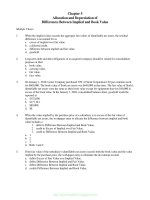advanced accounting 6e by jeter chaney chapter 12
Bạn đang xem bản rút gọn của tài liệu. Xem và tải ngay bản đầy đủ của tài liệu tại đây (515.69 KB, 47 trang )
Advanced
Accounting
Jeter ● Chaney
Accounting for Foreign
Currency Transactions
and Hedging Foreign
Exchange Risk
1
Prepared by Sheila Ammons, Austin Community College
Learning Objectives
• Distinguish between the terms “measured” and “denominated.”
• Describe what is meant by a foreign currency transaction.
• Understand some of the more common foreign currency transactions.
• Identify three stages of concern to accountants for foreign currency
transactions, and explain the steps used to translate foreign currency
transactions for each stage.
• Describe a forward exchange contract.
Copyright © 2015. John Wiley & Sons, Inc. All rights reserved.
Learning Objectives
• Explain the use of forward contracts as a hedge of an
unrecognized firm commitment.
• Identify some of the common situations in which a
forward exchange contract can be used as a hedge.
• Describe a derivative instrument and understand how it
may be used as a hedge.
• Explain how exchange gains and losses are reported for
fair value hedges and cash flow hedges.
Copyright © 2015. John Wiley & Sons, Inc. All rights reserved.
Foreign Currency Transactions
• Many U.S. companies engage in international activities
such as:
– Exporting or importing goods,
– Establishing a foreign branch, or
– Holding an equity investment in a foreign company.
Copyright © 2015. John Wiley & Sons, Inc. All rights reserved.
Foreign Currency Transactions
• Recording and reporting problems with foreign currency transactions:
– Transactions to be settled in a foreign currency must be translated
(expressed in dollars) before they can be aggregated with domestic
transactions of the U.S. firm.
– Receivables or payables denominated in foreign currencies are
subject to gains and losses.
• Due to the changes in exchange rates.
– Companies use hedging strategies with derivatives to minimize the
impact of exchange rate changes on their financial statements.
Copyright © 2015. John Wiley & Sons, Inc. All rights reserved.
Exchange Rates—Means of Translation
• Translation - process of expressing amounts stated in
terms in a foreign currency in the currency of the
reporting entity by using an appropriate exchange rate.
• Exchange rate - ratio between a unit of one currency
and another currency for which that unit can be
exchanged at a particular time.
Copyright © 2015. John Wiley & Sons, Inc. All rights reserved.
Exchange Rates—Means of
Translation
• Direct Exchange Quotation
– Units of domestic currency that can be converted into one unit of
foreign currency.
– Direct rate = 1.517 ($1.517 U.S. for 1 British pound)
• Indirect Exchange Quotation
– Units of foreign currency that can be converted into one unit of
domestic currency.
– Indirect rate = 1.00/1.517 = .6592 ($1 U.S. for .6592 British pound)
Copyright © 2015. John Wiley & Sons, Inc. All rights reserved.
Exchange Rates—Means of
Translation
• Spot Rate
– Rate at which currencies can be exchanged today.
• Forward or Future Rate
– Rate at which currencies can be exchanged at some future
date.
• Forward Exchange Contract
– Contract to exchange currencies of different countries on a
stipulated future date, at a specified rate (the forward rate).
Copyright © 2015. John Wiley & Sons, Inc. All rights reserved.
Exchange Rates—Means of
Translation
• Floating Rates
– Relationship between major currencies is determined
by supply and demand factors.
– Increase risk to companies doing business with a
foreign company.
Example – Payable to be settled in 100,000 yen
An increase in in the value of the yen to $.00625 would result in an increase in the payable to $625.
Copyright © 2015. John Wiley & Sons, Inc. All rights reserved.
Measured Versus Denominated
• Transactions are normally measured and recorded in terms of the
currency in which the reporting entity prepares its financial statements.
– Reporting Currency - usually the currency where the company is
located.
• Transaction between a U.S. firm and a foreign company:
– Companies negotiate whether settlement is to be made in dollars or
in the foreign currency.
– If settled by foreign currency, U.S. firm measures the receivable or
payable in dollars, but the transaction is denominated in the foreign
currency.
LO 1 Measured versus denominated.
Copyright © 2015. John Wiley & Sons, Inc. All rights reserved.
Foreign Currency Transactions
• Foreign Currency Transaction - requires payment or
receipt (settlement) in a foreign currency.
– U.S. firm exposed to risk of unfavorable changes in
the exchange rate.
Direct exchange rate increasing,
or foreign currency unit
strengthening.
Direct exchange rate
decreasing, or foreign
currency unit weakening.
=
More dollars needed to acquire
the foreign currency units.
=
Fewer dollars needed to
acquire the foreign currency
units.
LO 2 Foreign currency transaction.
Copyright © 2015. John Wiley & Sons, Inc. All rights reserved.
Foreign Currency Transactions
Importing or Exporting of Goods or Services
Translating Accounts Denominated in Foreign Currency
Transaction date
Balance sheet
date
Settlement
date
Units of foreign currency x Current direct exchange rate (spot rate)
Increase or decrease is generally reported as a foreign currency transaction gain
or loss, sometimes referred to as an exchange gain or loss, in determining net
income for the current period.
LO 3 Common transactions. LO 4 Three stages of concern.
Copyright © 2015. John Wiley & Sons, Inc. All rights reserved.
Foreign Currency Transactions
Exercise 12-2: During December of the current year, Teletex Systems,
Inc., a company based in Seattle, Washington, entered into the following
transactions:
Dec. 10 Sold seven office computers to a company located in
Colombia for 8,541,000 pesos. On this date, the spot rate was 365 pesos
per U.S. dollar.
U.S. firm
(Teletex)
Inventory delivered
12/10/Year 1
Columbia firm
8,541,000 pesos
received on 1/10/Year 2
LO 3 Common transactions. LO 4 Three stages of concern.
Copyright © 2015. John Wiley & Sons, Inc. All rights reserved.
Foreign Currency Transactions
Exercise 12-2: Dec. 10, Sold seven office computers to a company
located in Colombia for 8,541,000 pesos. On this date, the spot rate was
365 pesos per U.S. dollar. Prepare the journal entry on the books of
Teletex Systems, Inc. (periodic method)
Accounts Receivable
23,400
Sales
23,400
Sales price in pesos
8,541,000
Pesos per U.S. dollar
365
LO 3
Sales price in U.S. dollars
/
Common transactions. LO 4 Three stages
$ of concern.
Copyright © 2015. John Wiley & Sons, Inc. All rights reserved.
Foreign Currency Transactions
Exercise 12-2: Prepare journal entry necessary to adjust the accounts as
of December 31. Assume that on December 31 the direct exchange rates
was Colombia peso $.00268.
Transaction Loss
510
Accounts Receivable
510
Receivable in pesos
8,541,000
Direct exchange rate to U.S. dollar
Receivable in U.S. dollars
Balance in receivable
Transaction loss
$
$
$
.00268
22,890
23,400
510
LO 3 Common transactions. LO 4 Three stages of concern.
Copyright © 2015. John Wiley & Sons, Inc. All rights reserved.
Foreign Currency Transactions
Exercise 12-2: Prepare journal entry to record settlement of the account
on January 10. Assume that the direct exchange rate on the settlement
date was Colombia peso $.00320.
Cash (8,541,000 x $.00320)
27,331
Accounts Receivable ($23,400 - $510)
22,890
Transaction Gain
4,441
LO 3 Common transactions. LO 4 Three stages of concern.
Copyright © 2015. John Wiley & Sons, Inc. All rights reserved.
Foreign Currency Transactions
Exercise 12-2: During December of the current year, Teletex Systems,
Inc., a company based in Seattle, Washington, entered into the following
transactions:
Dec. 12 Purchased computer chips from a Taiwan company.
was denominated in 500,000 Taiwan dollars.
Direct exchange spot rate on this date was $.0391.
U.S. firm
(Teletex)
Contract
Inventory received
12/12/Year 1
Taiwan firm
500,000 Taiwan dollars
paid on 1/10/Year 2
LO 3 Common transactions. LO 4 Three stages of concern.
Copyright © 2015. John Wiley & Sons, Inc. All rights reserved.
Foreign Currency Transactions
Exercise 12-2: Dec. 12, Purchased computer chips from a company
domiciled in Taiwan. The contract was denominated in 500,000 Taiwan
dollars. The direct exchange spot rate on this date was $.0391. Prepare
the journal entry on the books of Teletex Systems, Inc.
Purchases
19,550
Accounts Payable
19,550
Purchase price in Taiwan dollars
500,000
Direct exchange rate to U.S. dollar
$.0391
LO 3 Common transactions. LO 4
Purchase price in U.S. dollars
Copyright © 2015. John Wiley & Sons, Inc. All rights reserved.
x
Three stages
$ of concern.
Foreign Currency Transactions
Exercise 12-2: Prepare journal entry necessary to adjust the account as
of December 31. Assume that on December 31 the direct exchange rates
was Taiwan dollar $.0351.
Accounts Payable
2,000
Transaction Gain
2,000
Payable in pesos
500,000
Direct exchange rate to U.S. dollar
Payable in U.S. dollars
Balance in payable
Transaction gain
$
$
$
.0351
17,550
19,550
2,000
LO 3 Common transactions. LO 4 Three stages of concern.
Copyright © 2015. John Wiley & Sons, Inc. All rights reserved.
Foreign Currency Transactions
Exercise 12-2: Prepare journal entry to record settlement of account on
January 10. Assume that the direct exchange rate on the settlement date
was Taiwan dollar $.0398.
Transaction Loss
2,350
Accounts Payable ($19,550 - $2,000)
17,550
Cash (500,000 x $.0398)
19,900
LO 3 Common transactions. LO 4 Three stages of concern.
Copyright © 2015. John Wiley & Sons, Inc. All rights reserved.
Foreign Currency Transactions
Importing or Exporting of Goods or Services: Two-transaction approach:
– Sale or purchase is viewed as a transaction separate and distinct from the
financing arrangement.
– Dollar amount recorded (in Sales or in Purchases) is determined by the exchange
rate on the transaction date.
– Adjustments to the foreign-currency-denominated receivable or payable are
recorded directly to the transaction gain or loss and included in net income.
• Transaction gain or loss
» Does not result from an operating decision to buy or sell goods or
services in a foreign market.
» But from a decision to delay the payment or receipt of foreign currency
and not to hedge the exposed receivable or payable.
LO 3 Common transactions. LO 4 Three stages of concern.
Copyright © 2015. John Wiley & Sons, Inc. All rights reserved.
Foreign Currency Transactions
Hedging Foreign Exchange Rate Risk
• Derivative Instrument - a financial instrument that
provides the holder (or writer) with the right (or obligation)
to participate in some or all of the price changes of another
underlying value of measure, but does not require the holder
to own or deliver the underlying value of measure.
– Two broad categories:
• Forward-based
• Option-based
Derivatives are recognized in the
balance sheet at their fair value,
resulting in a payable position for one
party and a receivable position for the
other.
LO 8 Derivatives as a hedge.
Copyright © 2015. John Wiley & Sons, Inc. All rights reserved.
Foreign Currency Transactions
Forward Exchange Contracts
A forward exchange contract (forward contract) is an agreement to
exchange currencies of two different countries at a specified rate (the
forward rate) on a stipulated future date.
LO 5 Forward exchange contracts.
Copyright © 2015. John Wiley & Sons, Inc. All rights reserved.
Foreign Currency Transactions
Which Kind of Forward Contract to Choose?
• Forward Contract used as a
1. Hedge of a(n):
– Foreign currency transaction.
– Unrecognized firm commitment (a fair value hedge).
– Foreign-currency-denominated “forecasted” transaction (a cash flow
hedge).
– Net investment in foreign operations.
2. Speculation:
– Forward contracts used to speculate changes in foreign currency.
LO 6 Hedging with forward contracts.
Copyright © 2015. John Wiley & Sons, Inc. All rights reserved.
Using Forward Contracts as a Hedge
Hedge of a Foreign Currency Exposed Liability
• Problem 12-2: Crystal Exporting Co. is a U.S. wholesaler engaged in foreign
trade. The following transaction is representative of its business dealings. The
company uses a periodic inventory system and is on a calendar-year basis. All
exchange rates are direct quotations.
• Dec. 1 Crystal Exporting purchased merchandise from Chang’s Ltd., a Hong
Kong manufacturer. The invoice was for 210,000 Hong Kong dollars, payable
on April 1. On this same date, Crystal Exporting acquired a forward contract
to buy 210,000 Hong Kong dollars on April 1 for $.1314.
LO 6 Hedging with forward contracts.
Copyright © 2015. John Wiley & Sons, Inc. All rights reserved.









